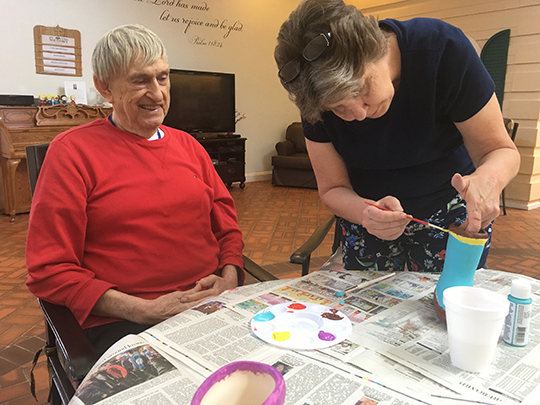5 Signs Your Senior Loved One May Need Memory Care

For someone with a dementia or Alzheimer’s diagnosis who is experiencing memory loss, confusion or disorientation, routine tasks may become increasingly difficult and require more hands-on daily help. As a caregiver of someone with dementia, you may start to notice certain behaviors that reveal your loved one would benefit from professional caregiving assistance.
Although each individual and situation is unique, there are many signs to help you determine if a memory care facility or an in-home professional caregiver is the best option for your loved one. Below are five common signs that indicate your loved one may benefit from professional memory care.
1. Your Loved One Exhibits Increased Care Needs
One of the first signs to take note of is your loved one’s ability to manage their daily needs. If they frequently neglect certain tasks that affect their health, like taking medications or eating meals regularly, or unintentionally begin behaviors like wandering, then it might be time to consider memory care. Memory care facilities, like those offered by Concordia, not only have a team of professional caregivers onsite to assist your loved one with activities of daily living (ADL), but also ensure that your loved one receives 24-hour care in an environment that prioritizes their needs.
2. You Experience Escalated Stress as a Caregiver
Caregiving can present a number of unique challenges, especially if your loved one faces additional health complications. If you are providing increased daily assistance, you may begin to feel overwhelmed, frustrated or guilty. Caregiver burnout can have an impact on your physical, social and mental health. If you notice you are feeling an escalated level of stress in relation to your caregiving responsibilities, it might be time to consider a memory care facility as a long-term care option. Not only do memory care facilities meet your loved one’s healthcare needs, but some memory care facilities, including Concordia’s, provide support groups and different resources specifically for family caregivers.
3. Your Loved One is Unable to Carry-Out Daily Tasks
Often, in the early stages of dementia or Alzheimer’s disease, individuals will continue with everyday tasks, or independent activities of daily living (IADL), such as financial planning, housework, shopping, cooking, managing medications and doctor’s appointments etc. as they normally would. However, they may complete these activities more slowly or forget to finish certain elements of the activity altogether. It is important to be aware of how frequently they have difficulty with these tasks. Taking note of these behaviors will help you determine if your loved one would benefit from memory care.
4. Your Loved One No Longer Participates in Social Activities
Participating in activities with friends and family members is an important part of your loved one’s health and overall wellness. Individuals who have dementia or Alzheimer’s disease may become increasingly fearful to leave a home environment, or they may isolate themselves from certain social situations altogether. Not only do memory care facilities offer services to meet your loved ones health and wellness needs, but they typically also provide a wide range of social activities, outings and more that ensure your loved one is staying active and engaged.
5. You Are Concerned for Your Loved One’s Safety
If you have concerns about your loved one wandering, potentially having a household emergency or being at risk of a fall or injury due to their memory-related condition, odds are they may benefit from living in a more secure environment that is suited for their needs. Memory care facilities, including Concordia’s, have many specialized safety features including alarmed doors, 24-hour support, exterior safety measures and more to ensure that your loved one is supervised and secure.
The Benefits of a Memory Care Facility
There are many reasons why your loved one might benefit from the caring, compassionate and engaging environment a memory care facility provides. Many memory care facilities offer services and amenities to not only meet the needs of your loved one, but also provide support services for family caregivers. Examples of the types of services and amenities available to residents and families include:
- Specialized care
- Onsite nursing staff
- Wellness programs
- Social events, outings and trips
- Comprehensive safety measures
- Caregiver Support Groups, education sessions and more
Concordia has dedicated memory care units at Concordia of Fox Chapel, Concordia of the South Hills, Concordia at Villa St. Joseph and Concordia Village of Tampa. Visit the locations page of our website to find a Concordia community near you, call our headquarters at 724-352-1571 or message us through our contact form 24 hours a day.
Get Updates From Concordia
There is always a LOT happening at Concordia! Would you like to stay up-to-date with our news and events? Sign up for our monthly e-newsletter here.